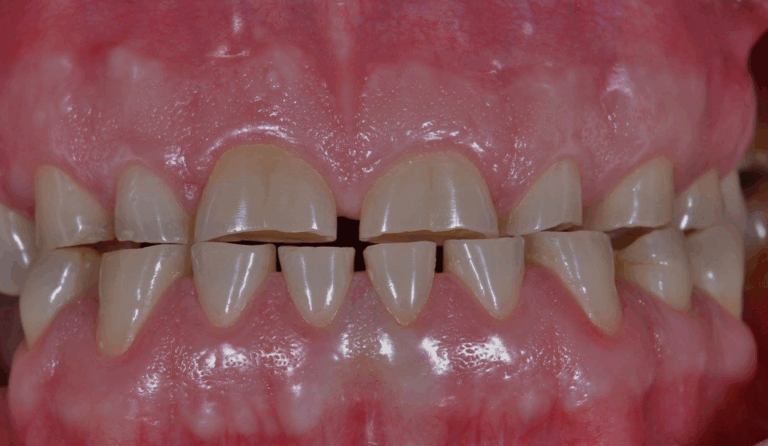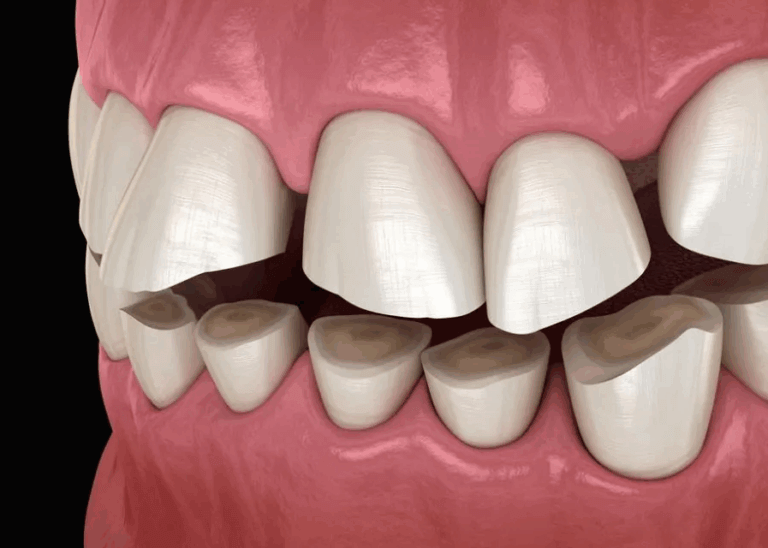Dental Attrition

What is Dental Attrition?
Dental attrition refers to the gradual wearing down of tooth surfaces due to tooth-to-tooth contact, often from chewing or grinding. It’s a natural part of aging, but excessive attrition can lead to dental problems like sensitivity, cracks, and even tooth loss. Understanding its causes, symptoms, and treatment options is key to maintaining oral health and a confident smile.
Once enamel is eroded away, it cannot regenerate, making early detection and prevention essential. Over time, premature teeth wear can lead to sensitivity, shorter teeth, and even tooth loss if left untreated. Before you contact a Toronto dentist to examine tooth attrition, there are some things you should know as a patient:
- Causes Of Dental Attrition
- Signs And Symptoms Of Dental Attrition
- Treatment Options For Dental Attrition
- Managing Dental Attrition Until You Can See The Dentist
- Frequently Asked Questions About Dental Attrition
If you have questions about Dental Attrition or other dental problems, please contact us for more information.
Causes of Dental Attrition
Dental attrition is primarily caused by prolonged or excessive contact between teeth. Common causes include:
- Bruxism (Teeth Grinding or Clenching): Chronic grinding can accelerate wear on tooth enamel.
- Aging: Natural enamel wear occurs over time with regular chewing and biting forces.
- Misaligned Teeth: Improper bite alignment increases stress on certain teeth, causing uneven wear.
- Dietary Habits: Chewing on hard foods or habits like nail biting can contribute to attrition.
Identifying and addressing the causes of premature teeth wear early can prevent more serious dental complications down the road. If you think you are at risk of Dental Attrition, contact us at Atlas Dental for a thorough examination.

Signs And Symptoms Of Dental Attrition
Recognizing the signs of premature teeth wear is crucial for early intervention. Look for:
- Flattened or Shortened Teeth: Especially on the biting surfaces.
- Increased Tooth Sensitivity: Exposed dentin can cause discomfort with hot, cold, or sweet foods.
- Cracks or Chips: As enamel wears down, teeth become more prone to fractures.
- Changes in Bite: Excessive attrition can affect how teeth fit together.
If you notice any of these symptoms, contact us at Atlas Dental to assess the extent of attrition and prevent further damage.
Treatment Options For Dental Attrition
Treatment depends on the severity of wear and the underlying cause:
- Dental Crowns: Restore tooth shape, size, and strength.
- Occlusal Guards (Nightguards): Protect teeth from further wear due to bruxism.
- Invisalign Clear Aligner Orthodontics: Correct misalignment and distribute bite forces evenly.
- Restorative Fillings or Bonding: Repair localized wear and prevent sensitivity.
- Full Mouth Reconstruction: For severe, generalized attrition affecting most teeth, a comprehensive plan combining crowns, veneers, orthodontics, and other treatments may be necessary to restore both function and aesthetics.
Your dentist will recommend treatments to restore tooth structure, protect remaining enamel, and improve function and aesthetics. For more information about how Atlas Dental can help treat dental attrition, please contact us.

Managing Dental Attrition Until You Can See The Dentist
If you suspect dental attrition but can’t see a dentist right away, try the following:
- Use a Nightguard: Protect teeth from grinding while sleeping.
- Avoid Hard Foods: Reduce stress on already weakened teeth.
- Practice Good Oral Hygiene: Prevent decay and further wear.
- Monitor for Changes: Note any worsening symptoms or new discomfort.
Taking proactive steps can help minimize damage until you can seek professional care. If you have further questions about how to manage premature teeth wear, please contact us.
Frequently Asked Questions About Dental Attrition
- Can dental attrition be reversed?
No, enamel loss from premature teeth wear is permanent, but dental restorations can rebuild lost structure and protect teeth.
- Is dental attrition painful?
It may not be painful initially, but as enamel wears down, sensitivity and discomfort can develop.
- How can I prevent dental attrition?
Using a nightguard, addressing bite issues, and avoiding harmful habits can help prevent excessive wear.
- Is dental attrition common?
Yes, it’s a natural part of aging, but excessive or early teeth wear should be evaluated by a dentist.
If you have tooth attrition, don’t wait—seeking prompt dental care can prevent further damage and restore your smile quickly and effectively. If you have further questions about how to treat premature teeth wear, please contact us.

